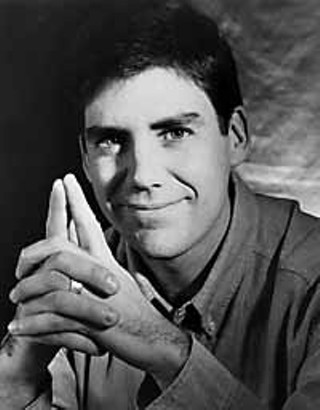Diving for Pearls
How mystery writer Rick Riordan went looking for authenticity
By Roger Gathman, Fri., Aug. 17, 2001

When Edgar Allen Poe invented the detective story in April, 1841 (the date "Murders in the Rue Morgue" appeared in the Southern Literary Messenger), he'd never visited Paris, the city in which the story is set; he'd never met a private eye (for the simple reason that there weren't any); he'd never even hung out with the cops on the beat, as far as we know, nor been in a forensics laboratory. There were no forensic laboratories, and patrolling city cops were an ultra-modern innovation being tried out, to much criticism, in London. Nevertheless, Poe, in one magic moment, invented the framework of all succeeding mysteries -- the private, unmarried detective; the faithful companion, in juxtaposition to whose duller sensibility the detective's lightning-like deductions shine with a more unearthly glitter; the hostile and rather thick-headed chief of police; and, most importantly, the crime-puzzle. It was DeQuincy who first wrote about the fine art of murder, but it was Poe who took that idea seriously. Although there'd been enigmas in plots before, never before had a plot been all puzzle. Never before, that is, had the reader been induced to see fiction in terms of an intellectual task, a problem to be solved, rather than as a mode of identification with the particular passions of a set of characters. As Borges once remarked, "If Poe created the detective story, he subsequently created the reader of detective fiction."
What Borges forgot to add is that the mystery reader subsequently remade the mystery writer. Poe could sit in his armchair in Baltimore and dream of Paris and purloined letters, but the contemporary reader wants his author to have been to Paris and to have taken a course in handwriting identification. Patricia Cornwell, who has succeeded to Poe's place in Richmond, in a manner of speaking, trains with the FBI at Quantico. Joseph Wambaugh is a retired L.A. cop. James Ellroy's mother really was murdered. Today's reader no longer wants his poetry unmodified by technical expertise. He wants authenticity, or at least a course credit in it.
It was in pursuit of this realism that Rick Riordan, a short man with salt-and-pepper hair and a slight case of middle-aged spread, suited himself up in diving togs last September and took a 60-foot plunge into Lake Travis. A significant part of his new novel, The Devil Went Down to Austin (Bantam, $23.95), takes place around, on top of, and under the Lake. But the deep, psychological reason for the watersports was a poetic flash Poe himself would have been proud of. Riordan had become obsessed with the idea of a woman hung from a tree at the bottom of a lake.
He hadn't counted on this image in his original conception of the novel. "I've always liked Austin, and I've seen it change, incredibly, in the last 10 years," Riordan says. He makes his home in San Antonio, the locale for his previous three Tres Navarre mysteries.
"I decided I wanted to set the next one in Austin, and I wanted it to be about high tech. My uncle lives here -- he's been a computer programmer since the Seventies -- so I knew I could go to him about the details. I contacted the Travis County Police, and I went out with them. They were kind enough to let me tag along, and they took me to Lake Travis.
"When I lived in Austin in the Eighties, going to UT, I never really noticed Lake Travis. I mean, to think about. Well, the police sometimes have to go down to retrieve bodies, and so I heard about the Lake from them. When Mansfield Dam was built, and they flooded the area, you think that it all washes away, but it doesn't. There really are pecan groves down there still, and they say they even have the pecans on the trees -- the last pecans they ever grew. And barbed wire fences. What the land was like until it was taken and flooded.
"Anyway, they told me about a diver who had gone down there and had gotten entangled in the branches of one of those pecans. So at 100 feet below the surface of the lake he died, hanging in a tree. That gave me this sudden image, the central image of the book: a woman hanging from the branch of a tree at the bottom of a lake. I had to use that. So I went out and took some diving lessons, and I went down 60 feet. I discovered the climate below the lake -- you go through one thermocline to another, and it is like hitting a brick wall. It was very cold, and very creepy."

We are having lunch at El Sol y la Luna, and if this interview were included in one of Riordan's mysteries, I'd describe the menu and the specialty of the house. One of the charming things about the four books in the Tres Navarre series is the way Riordan mixes his favorite eating places and singers with the corpse-strewn action. "I won't use a real place if I am going to write bad things about it, but otherwise, I like mentioning real places," Riordan says. "It is something recognizable for Texans, but it doesn't put off readers who aren't Texans." So in the course of The Widower's Two-Step, Tres Navarre, making a brief excursion up to Austin to track down a missing singer, attends a concert at the Cactus Cafe and has coffee at Texas French Bread on Guadalupe. In his latest, Austin-centric mystery, a fight breaks out at a wake held inside Scholz Garten while Kinky Friedman sings at a wedding reception out on the patio.
Riordan, for the record, orders the chicken mole tacos, which he recommends.
It was nostalgia for these places that prompted Riordan to write his first novel. Born and raised in the Alamo Heights section of San Antonio, Riordan says, "I was one of the artsy-fartsy rebels. I ran an underground newspaper, played music, and I wrote my first short story when I was in middle school. I even submitted it to Isaac Asimov's Science Fiction stories, so I got my first rejection when I was 13. It's important to get your first one."
He came to UT and majored in history and English, but his focus was on music back then. "We had a folk trio called Shenandoah, did Bob Dylan and stuff, played at Maggie Mae's, played down in San Marcos a lot. It wasn't big money, but it wasn't too bad. Whenever I want to scare people I take out my long-hair pictures. I don't take them out too much, though, because everybody accuses me of looking like Tony Orlando."
After UT, Riordan and his high school girlfriend Becky took off for San Francisco. "Yes, I married my high school sweetheart. We got out there, and I landed a job at a famous private school, Presidio Hill. It was founded by these feminist poets in the Twenties as an alternative arts school. Consequently, the kids of rock musicians and the kids of writers went there. It was fun."
However, settled down in the midst of such grooviness, Riordan experienced a strange thing: homesickness. "I hadn't anticipated missing Texas at all." To assuage his nostalgia, Riordan listened to a lot of Texas music -- Robert Earl Keen, Nanci Griffith, Lyle Lovett. And this music seeped into his first novel, The Big Red Tequila. That it was a mystery was in some ways a fluke.
"I began this thing as a lark," he says. "It soon was apparent to me that this was different -- it felt different from things I had written before, it grabbed me by the throat and said, 'You are going to write me.' Well, all right, I did. At this time I was taking a mystery class at Berkeley with Shelly Singer, who introduced me to Sisters in Crime, a sort of mystery support group." Riordan's first book was taken by Bantam as a paperback in a two-book contract, which meant that Riordan had to create a series. The second book (The Widower's Two-Step) received an Edgar for best paperback novel, which gave Riordan a chance to wear a tux at a New York hotel and meet the upper echelon of mystery writers, like Sue Grafton.
Riordan and his wife by this time had moved back to San Antonio, where he got a job teaching 6th and 8th graders at St. Mary's Hall, a private school. "Sometimes my kids will go out and get my novels just so they can bug me. I had one come up to me and say, Mr. Riordan, did you know you used the 'F' word 58 times in one of your novels?" Riordan laughed. "Well, at least he got something out of it."
For Riordan, the uniqueness of the private eye motif in Texas is that Texans understand nostalgia for lost territory. In his latest novel, that issue arises in the character of Ruby McBride.
"Her family owned land that was flooded by the lake, when they built the Mansfield Dam, and she is obsessed with her submerged heritage. In the book, she's the partner in a high tech firm, and the point for her is to use the money she makes to roll back the flood, but instead she becomes a victim of it. I don't want to press too heavily on my metaphors, but I think this is what has happened to Austin in the last 10 years. With the advent of these new companies and all of these people, the old Austin is underwater." ![]()








